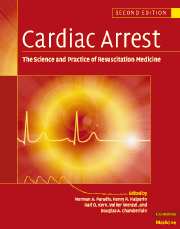Book contents
- Frontmatter
- Contents
- List of contributors
- Foreword
- Preface
- Part I Introduction
- Part II Basic science
- Part III The pathophysiology of global ischemia and reperfusion
- Part IV Therapy of sudden death
- Part V Postresuscitation disease and its care
- Part VI Special resuscitation circumstances
- Part VII Special issues in resuscitation
- Index
Foreword
Published online by Cambridge University Press: 06 January 2010
- Frontmatter
- Contents
- List of contributors
- Foreword
- Preface
- Part I Introduction
- Part II Basic science
- Part III The pathophysiology of global ischemia and reperfusion
- Part IV Therapy of sudden death
- Part V Postresuscitation disease and its care
- Part VI Special resuscitation circumstances
- Part VII Special issues in resuscitation
- Index
Summary
This monograph on cardiac resuscitation medicine is the standard reference in the field. This Second Edition a decade later presents an entirely changed and dynamic field. Advances in resuscitative medicine encompass the basic science understanding of physiology and pathophysiology as well as advances in understanding of the causal mechanisms involved in successful or non-successful resuscitation. There are new programs and approaches at a practical and real-world level that improve survival and the quality of survival from cardiac arrest. I would maintain that these prerequisites relate to the need for this updated monograph. It is important that this text be acquired and used by providers of emergency cardiac care in both the out-of-hospital and in-hospital settings. It will be of value universally in the emergency departments. Clinical investigators will find this text of tremendous value when pursuing the improvement of survival from cardiac arrest, as well as laboratory-based clinical investigators attempting to identify and justify approaches to improving the outcome of cardiac arrest. As the underlying science of resuscitation deepens, basic scientists will value these state-of-the-art discussions. Resuscitation Science has broadened the focus from mechanics to reperfusion injury, post-resuscitation inflammation and programmed cell death.
To substantiate my statements about this update and its value to the medical and resuscitative community, I have identified what I consider to be the eight major advances in resuscitative medicine over the last decade.
- Type
- Chapter
- Information
- Cardiac ArrestThe Science and Practice of Resuscitation Medicine, pp. xxvii - xxxPublisher: Cambridge University PressPrint publication year: 2007



